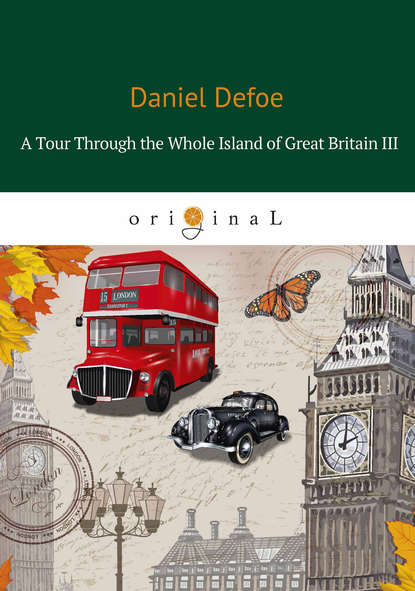По всем вопросам обращайтесь на: info@litportal.ru
(©) 2003-2024.
✖
A Tour Through the Whole Island of Great Britain III
Настройки чтения
Размер шрифта
Высота строк
Поля
The prebendaries preach in their turn every Sunday morning, and on such festivals, &c. as preaching is required. In the afternoon on Sundays there is a lecture usually preached by the residentiary for the time being.
The Chapter of Southwell have a peculiar jurisdiction, and there are 28 parishes subject to it; to most of which they have the right of presentation; besides some others in Lincolnshire and Yorkshire. This jurisdiction is exercised by a commissary or vicar-general, chosen by the Chapter out of their body, who holds visitations, &c. twice a year. And besides these, there are two synods yearly, to which ail the clergy of the county of Nottingham pay their attendance. And a certain number of the prebendaries, and others of the considerable clergy, are appointed commissioners, by a commission granted by the Archbishop of York to preside at the synods.
There are many privileges belonging to this church; one of which is, That every parish and hamlet in the county pay certain small pensions yearly to the church, called Pentecostal Offerings.
There are houses for the vicars choral adjoining to the residence house, built about a square; with a gate locked up every night, and the key kept by the residentiary. There are but five of the vicars have houses allotted them in the college. The other vicar, being parish vicar also has a vicarage house in the town. There are prayers twice every day at the usual hours, and likewise at six or seven in the morning, from Ashwednesday to St. Matthew’s Day.
The civil government of the jurisdiction of Southwell, is distinct from the county at large. It is called the Soke of Southwell cum Scrooby, which is another town in this county. There are about 20 towns subject to this jurisdiction.
The Custos Rotulorum, and the Justices of the Peace, are nominated by the Archbishop of York, and constituted by a commission under the Great Seal of England; who hold their session both at Southwell and Scrooby, and perform all other justiciary acts distinct from the county. There is no Custos Rotulorum yet appointed in the room of Lord Lexington, who died about two years ago; but a new commission is expected as soon as the archbishop is confirmed.
The Names of the present Prebendaries and Prebends, are.
The fabrick of the church is at present in good and decent order. It is a strong building of the Gothick order, very plain. I remember to have met with this passage in some of our old writings; That when the dispute was about the dissolution of the church, I think in King James’s reign; among other things, it was urged by the Chapter, that the church of Southwell was a plain fabrick, free from all superstitious ornaments; that there were no painted figures in the glass-work, nor images, nor so much as a nitch capable of placing an image in; which I think is true. And from hence too it has been conjectured concerning the antiquity of this church, that it was probably built, before image-worship was practised or thought of in the Christian Church.
This church was a great part of it burnt down in the year 1711, by lightning; of which I find this memorandum in one of our books, viz. “On Monday the 5th of November, 1711. about ten a-clock at night, the top of the ball on one of the south spires of this collegiate church of Southwell was fired by lightning; which, backed by a furious wind that drove it almost directly on the body of the church, in a few hours burnt down the spire and roof, melted down the bells, and spared nothing that was combustible, except the other spire, till it came to the quire, where, after it had consumed the organs, it was by singular providence stopt and extinguish’d.”
This is a pretty exact account; to which I must add, that the damage was computed at near 4000l. which great misfortune was happily repaired by the industry of the Chapter, joined with the help of the then Archbishop of York, Dr. Sharp; who not only contributed largely themselves, but by their solicitations obtained a brief, which, with the liberal contributions of several of the nobility and gentry, and the inhabitants of Southwell and its neighbourhood, enabled them to repair the church, and to put it in as good order as it was before the fire.
Among the benefactors ought particularly to be remembered with gratitude the last Dutchess Dowager of Newcastle, who, at the intercession of the archbishop, kindly seconded by her chaplain Dr. Brailsford, now Dean of Wells,
The church is built in form of a cross; a great tower in the middle, in which are eight bells, and two spires at the west end. There is a handsome chapter-house on the north side of the quire.
The length of the church from east to west is 306 feet, of which the choir is – feet; the length of the cross isle from north to south is 121 feet; the breadth of the church 59 feet.
On a pillar at the entrance into the choir, is this inscription:
Sint Reges Nutritii tui & Regina? Nutrices,
Ecclesiam hanc Collegiatam & Parochialem
Fundavit Antiquitas.
Refundavit Illustrissimus Henricus Rex Octavus,
Edwardo Lee Archiepiscopo Eborac. intercedente.
Sancivit Serenissima Elizabetha Regina,
Edvino Sands Eborum Archiepiscopo mediante.
Stabilivit Præpotentissimus Monarcha Jac. Rex,
Henrico Howard Comite Northamp. aliisque
Supplicantibus.
Sint sicut Oreb & Zeb, Zeba & Salmana
Qui dicunt Haereditate possideamus
Sanctuarium Dei.
There are no very remarkable monuments in this church, only one of Archbishop Sands, which is within the communion rails, and is a fair tomb of alabaster, with his effigies lying on it at full length. – Round the verge of it is this inscription: Edvinus Sandes Sacræ Theologiæ Doctor, postquam Vigorniensem Episcopatum Annos X, totidemque tribus demptis Londinensem gessisset Eboracensis sui Archiepiscopatus Anno XII” Vitæ autem LXIX?. obiit Julii X. A. D. 1588.
At the head of the tomb is this inscription:
Cujus hic Reconditum Cadaver jacet, genere non humilis vixit, Dignitate locoque magnus, exemplo major; duplici functus Episcopatu, Archi-Episcopali tandem Amplitudine Illustris. Honores hosce mercatus grandi Pretio, Meritis Virtutibusque Homo hominum a Malitia & Vindicta Innocentissimus; Magnanimus, Apertus, & tantum Nescius adulari; Summe Liberalis atque Misericors: Hospitalissime optimus, Facilis, & in sola Vitia superbus. Scilicet haud minora, quam locutus est, vixit & fuit. In Evangelii prædicand. Laboribus ad extremum usque Halitum mirabiliter assiduus; a sermonibus ejus nunquam non melior discederes. Facundus nolebat esse & videbatur; ignavos, sedulatitis suæ Conscius, oderat. Bonas literas auxit pro Facultatibus; Ecclesiæ Patrimonium, velut rem Deo consecratum decuit, intactum defendit; gratia, qua floruit, apud Illustrissimam mortalium Elizabetham, effecit, ne hanc, in qua jacet, Ecclesiam ti jacentem cerneres. Venerande Præsul! Utrius memorandum Fortunæ exemplar! Qui tanta cura gesseris, multa his majora, animo ad omnia semper impavido, perpessus es; Careares, Exilia, amplissimarum Facultatum amissiones; quodque omnium difficillime Innocens perferre animus censuevit, immanes Calumnias; & si re una votis tuis memor, quod Christo Testimonium etiam sanguine non præbueris; attamen, qui in prosperis tantos fluctus, & post Aronum tot adversa, tandem quietis sempternæ Portum, fessus Mundi, Deique sitiens, reperisti, Æturnum lætare; vice sanguinis sunt sudores tui; abi lector, nec ista scias, tantum ut sciveris, sed ut imiteris.
At the feet under the coat of arms:
Verbum Dei manet in Æternum.
Round the border of another stone in the south isle of the choir.
Hic jacet Robertus Serlby, Generosus, quondam Famulus Willielmi Booth Archiepiscopo Eborac. Qui obiit 24? die Mensis Augusti, A. D. 1480, cujus animæ propitietur Deus. Amen.
On a stone fixed in the wainscot under one of the prebendal stalls in the choir, is this inscription, very antient, but without a date.
Hic jacet Wilhelmus Talbot, miser & indignus sacerdos, expectans Resurrectionem in signo Thau –
I suppose it means a Tau to denote a cross.
On the south-side of the church in the churchyard,
Me Pede quando teris, Homo qui Mortem mediteris Sic contritus eris, & pro me quæro, preceris, without name or date.
Here was formerly a palace belonging to the Archbishop of York, which stood on the south side of the church, the ruins of which still remain; by which it appears to have been a large and stately palace. It was demolished in the time of the Rebellion against King Charles I. and the church, I have heard, hardly escaped the fury of those times; but was indebted to the good offices of one Edward Cludd, Esq; one of the Parliament side, who lived at Norwood, in the parish of Southwell, in a house belonging to the archbishop, where he lived in good esteem for some time after the Restauration; and left this estate at Norwood, which he held by lease of the archbishop, to his nephew Mr. Bartholomew Fillingham, who was a considerable officer in the Exchequer, and from whom Bartholomew Burton, Esq; who was his nephew and heir, inherited it, with the bulk of all the rest of his estate and who now enjoys it by a lease of three lives, granted by the late Archbishop Sir William Dawes. Here were no less than three parks belonging to the archbishop, which tho’ disparked, still retain the name; one of which is Norwood Park, in which is a good house, which has been very much enlarged and beautified by the said Mr. Burton, who lives in it some part of the year.
There is a free-school adjoining to the church, under the care of the Chapter; where the choristers are taught gratis; and other boys belonging to the town. The master is chosen by the Chapter; and is to be approved by the Archbishop of York.
There are also two fellowships and two scholarships in St. John’s College in Cambridge, founded by Dr. Keton, Canon of Salisbury, in the 22d year of King Henry VIII. to be chosen by the master and fellows of the said college, out of such who have been choristers of the church of Southwell, if any such able person for learning and manners, can be found in Southwell, or in the university of Cambridge; and for want of such, then out of any scholars abiding in Cambridge; which said fellowships are to be thirteen shillings and four-pence each better than any other fellowship of the college.
Hence crossing the forest I came to Mansfield, a market town, but without any remarkables. In my way I visited the noble seat of the Duke of Kingston at Thoresby, of the Duke of Newcastle at Welbeck, and the Marquis of Hallifax at Rufford, of Rugeford Abbey, all very noble seats, tho’ antient, and that at Welbeck especially, beautify’d with large additions, fine apartments, and good gardens; but particularly the park, well stocked with large timber, and the finest kind, as well as the largest quantity of deer that are any where to be seen; for the late duke’s delight being chiefly on horseback and in the chace, it is not to be wondered if he rather made his parks fine than his gardens, and his stables than his mansion-house; yet the house is noble, large, and magnificent.
Hard by Welbeck is Wirksop Mannor, the antient and stately seat of the noble family of Talbot, descended by a long line of ancestors from another family illustrious, though not enobled (of Lovetot’s). This house, (tho’ in its antient figure) is outdone by none of the best and greatest in the county, except Wollaton Hall, already mentioned; and that though it is, as it were, deserted of its noble patrons; the family of Shrewsbury being in the person of the last duke, removed from this side of the country to another fine seat in the west, already mentioned.
From hence leaving Nottinghamshire, the west part abounding with lead and coal, I cross’d over that fury of a river called the Derwent, and came to Derby, the capital of the county.
This is a fine, beautiful, and pleasant town; it has more families of gentlemen in it than is usual in towns so remote, and therefore here is a great deal of good and some gay company: Perhaps the rather, because the Peak being so near, and taking up the larger part of the county, and being so inhospitable, so rugged and so wild a place, the gentry choose to reside at Derby, rather than upon their estates, as they do in other places.
It must be allowed, that the twelve miles between Nottingham and this town, keeping the mid-way between the Trent on the left, and the mountains on the right, are as agreeable with respect to the situation, the soil, and the well planting of the country, as any spot of ground, at least that I have seen of that length, in England.
The town of Derby is situated on the west bank of the Derwent, over which it has a very fine bridge, well built, but antient, and a chapel upon the bridge, now converted into a dwelling-house. Here is a curiosity in trade worth observing, as being the only one of its kind in England, namely, a throwing or throwster’s mill, which performs by a wheel turn’d by the water; and though it cannot perform the doubling part of a throwster’s work, which can only be done by a handwheel, yet it turns the other work, and performs the labour of many hands. Whether it answers the expence or not, that is not my business.
This work was erected by one Soracule, a man expert in making mill-work, especially for raising water to supply towns for family use: But he made a very odd experiment at this place; for going to show some gentlemen the curiosity, as he called it, of his mili, and crossing the planks which lay just above the millwheel; regarding, it seems, what he was to show his friends more than the place where he was, and too eager in describing things, keeping his eye rather upon what he pointed at with his fingers than what he stept upon with his feet, he stepp’d awry and slipt into the river.
He was so very close to the sluice which let the water out upon the wheel, and which was then pulled up, that tho’ help was just at hand, there was no taking hold of him, till by the force of the water he was carried through, and pushed just under the large wheel, which was then going round at a great rate. The body being thus forc’d in between two of the plashers of the wheel, stopt the motion for a little while, till the water pushing hard to force its way, the plasher beyond him gave way and broke; upon which the wheel went again, and, like Jonah’s whale, spewed him out, not upon dry land, but into that part they call the apron, and so to the mill-tail, where he was taken up, and received no hurt at all.

















